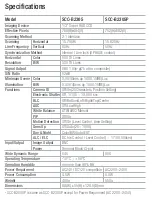
Document:
RE-BCC DCC 1F7
Document:
RE-BCC DCC 1F7
Document:
RE-BCC DCC 1F7
Page:
1
Page:
1
OWNER'S MANUAL
RE-RE-BCCxx DCCxx analog and AHD waterproof cameras with IR
DSE srl - Digital Surveillance Equipment -
WWW.DSE.EU
DSE srl - Digital Surveillance Equipment -
WWW.DSE.EU
RE-BCCxxx (cylindrical models)
RE-DCCxxx (spherical models)
Product description
This range of analog cameras is realized to satisfy all requirements of video surveillance in both
indoor and outdoor. The cameras are contained in a casing made of aluminum tin that can be
installed outdoors without protections and does not fear the rain. The cameras include an infrared
illuminator for viewing in the dark so as to ensure surveillance 24 hours on 24.
Connections and controls
Fixing cylindrical cameras
- Cameras
Fixing cylindrical cameras
- Cameras
cylindrical are equipped with an integrated bracket for wall mounting, specially designed to allow
the passage of cables inside it and protect them from tampering. The camera is mounted
generally in the output cables so as not to leave exposed wires. The fixing base has, however,
also with a slot lateral cable outlet if the cables come in laterally outer raceway. The bracket is
fastened to the wall or ceiling with the supplied dowels.
Fixing spherical cameras -
The spherical cameras are composed from the camera and
Fixing spherical cameras -
The spherical cameras are composed from the camera and
Fixing spherical cameras -
The spherical cameras are composed from the camera and
from the mounting base which are screwed to each other. Prior to mounting, unscrew the base of
fixing
separating it from the camera body. No need for tools typically used to loosen the mounting base
from the camera body, however, if this proves too tight at the bottom it is possible to help placing
a rigid rod, for example a screwdriver, between the two outlet eyelets lateral cables placed in the
base. The fixing base, separate
from
camera is fixed to the wall or wall with
dowels
in
correspondence
of the
hole of cables exit and on
it
screws
subsequently
the
body
camera.
Before tighten properly orient the viewing angle.
BNC video output
At the BNC female bayonet
connecting the video cable that leads
then to monitor or DVR typically using
RG59 coaxial cable and BNC
connector. Yes they can
also
use twisted pair cables with balun
converters.
Jack DC12V
We must connect a 12VDC power supply stabilized by at least 1000 mA, such
Jack DC12V
We must connect a 12VDC power supply stabilized by at least 1000 mA, such
as RE-AL4S model / C (not inclusive).
The requested plug is the standard 5.5 mm. Attention to use STABILIZED feeders that provide
12V in any load condition. The use of a different supply voltage from 12VDC can generate video
disorders and in the worst cases damage the camera. Beware extension power cables are too
long or
small section,
that could
to introduce
excessive fall
species voltage at the time
IR illuminator ignition.
Housing connections
- The video connections and
Housing connections
- The video connections and
power supply must be protected from the weather and housed in special electrical containers. For
this reason, the cameras are equipped with an integrated cable about 50 cm
length to reach the box which goes arranged nearby. For some camera models are
available as an optional accessory prolonged mounting bases to hold the connections inside.
Adjust zoom / focus
- Cameras with
Adjust zoom / focus
- Cameras with
fixed lens (IR up to 20 m.) does not require focus as set at the factory for most applications. The
adjustable lens cameras are equipped with 2 external screws that allow to adjust the lens focal
length and the
fire without opening
the casing of the camera. Acting initially on ZOOM lives and
regular
the breadth
the frame
(Wide / Zoom)
based on the area to be framed.
Remember that in most wide angle corresponds inevitably less image detail. Once you defined
the field of view act on the FOCUS screw to focus perfectly framed area. Recall that each lens
has its own depth of field to which it is possible to put in focus in a perfect way only a portion of
the space in front of the camera. Concentrate on the most important area to adjust the focus
optimally.
CAUTION:
The commissioning fire screws have a limit block that avoids to spill the
optimally.
CAUTION:
The commissioning fire screws have a limit block that avoids to spill the
optimally.
CAUTION:
The commissioning fire screws have a limit block that avoids to spill the
ferrules drive from their home. E 'need not force over the limit switch to avoid damage to the
adjustment mechanism.
Adjusting cameras with autofocus zoom
- The
Adjusting cameras with autofocus zoom
- The
cameras with autofocus zoom does not have a local adjustment screw, as the objective is
controlled remotely via RS485 serial line. These cameras are equipped with two additional cables
which must be connected to the RS485 port of the DVR (CABLE BLUE = RS485 + / A CABLE
BROWN = RS485- / B) via a twisted pair. The communication protocol Pelco D is the standard of
all our tellecamere. The protocol parameters are factory ADDRESS: 1, SPEED '2400 baud. If you
install more than one camera of this type to the same bus, each camera must be set to a different
ID address. E 'can change address and speed in UTC menu of the camera (see below)
IR Illuminator
The cameras incorporate within them an infrared illuminator that emanates illumination invisible
to the human eye, but visible to the camera. The illuminator turns itself on when it gets dark and
the camera switches alone in night vision mode. The illuminator ignition allows the vision in B /
N in absolute darkness until its scope lighting.





















